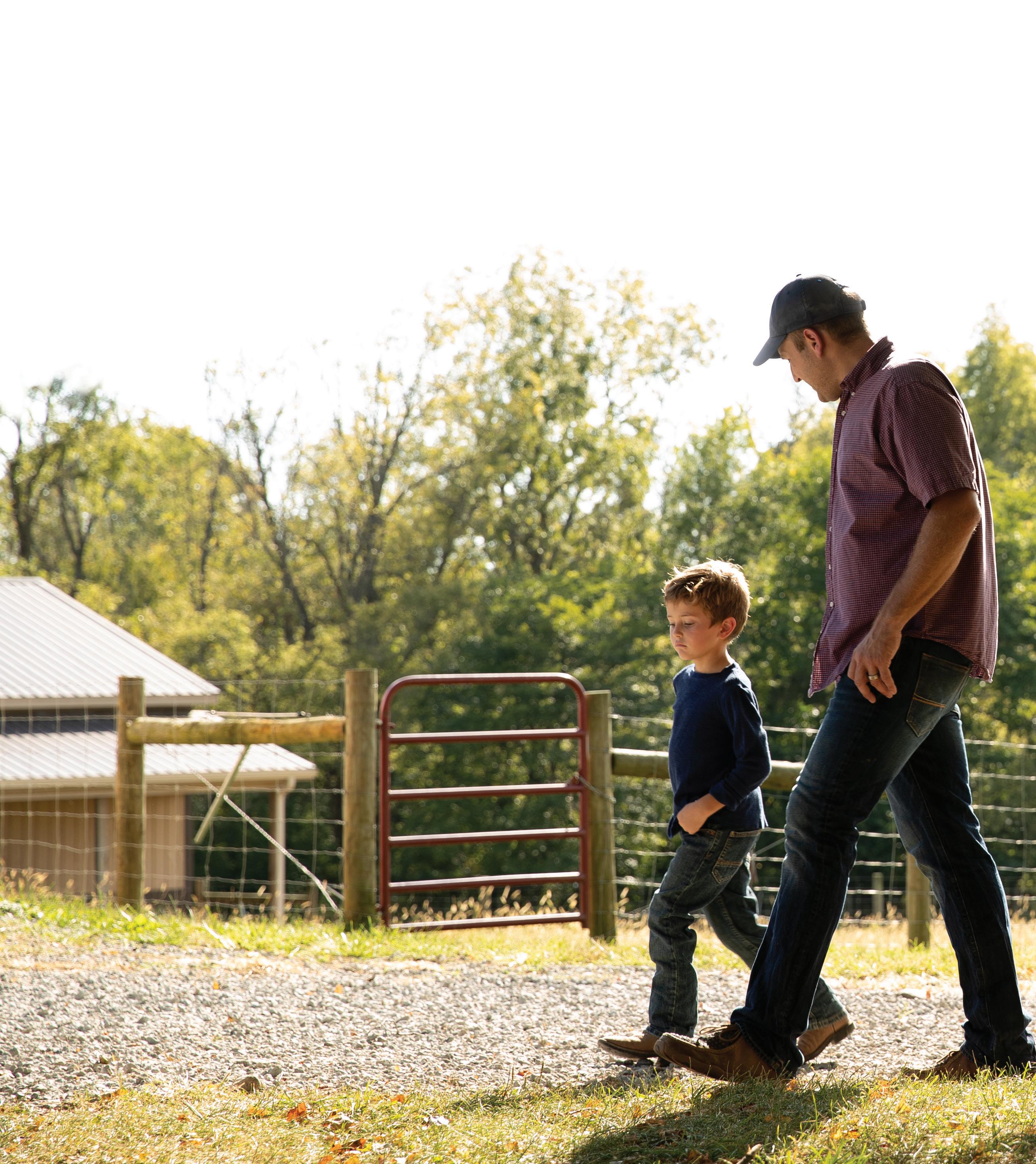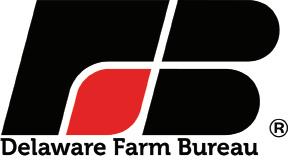
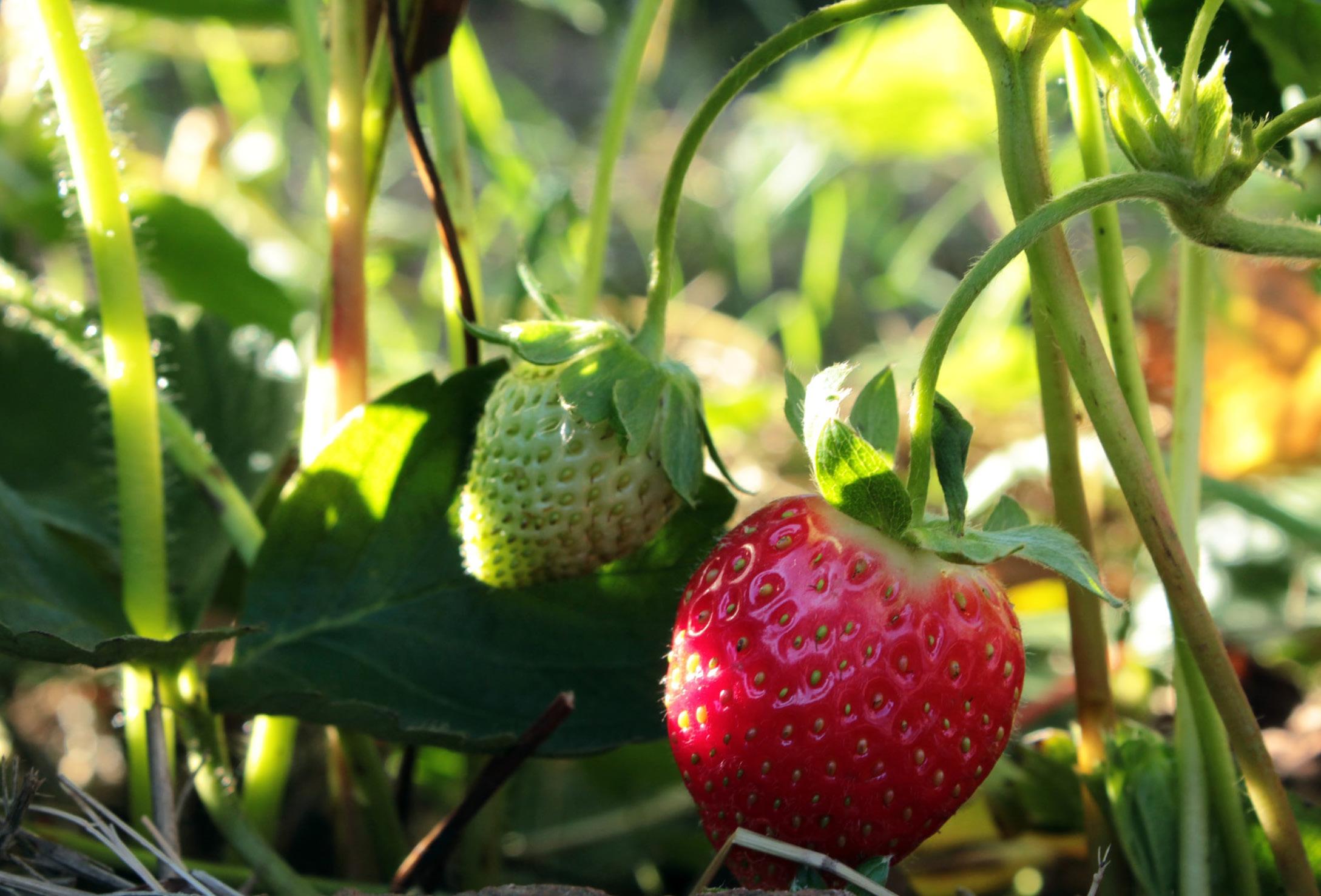





"What's that got to do with the price of eggs?"
Chances are, we've all heard that phrase in Delaware. Some of us might even catch ourselves saying it from time to time.
Around Easter, I had the opportunity to talk about just that with a news reporter from WMDT — the rising price of eggs, that is — while advocating for our farmers.
Every chance to highlight the great agricultural work done here in Delaware is an opportunity wellused in my book.
Similarly, Delaware Farm Bureau's committees are continuing their work by gearing up for exciting events like the annual Delaware State Fair and the Strawberry Festival to raise money for our scholarship programs and educate our consumers. The spring and summer months are filled with opportunities to get out of the field and enjoy the company of fellow Farm Bureau members while supporting our causes.
Advocacy work in our home state, rooting for farmers and ranchers, and supporting our youth is at the core of our work at the Farm Bureau. But it doesn’t stop there.
Our legislative breakfasts in March, for example, highlighted
Delaware Farm Bureau News
Editor Jennifer Antonik jenn.antonik@defb.org 302-697-3183
Delaware Farm Bureau News (ISSN 10770798), published in Camden, DE, bimonthly, by Delaware Farm Bureau. Production by Delaware Printing Company. Periodicals postage paid at Camden, DE and additional offices.
Business and Editorial Offices: 3457 S. DuPont Highway, Camden, DE 19934, 302-697-3183.
Any editorial material may be reproduced with credit to this publication.
POSTMASTER: Send address changes to Delaware Farm Bureau News at the office above. Subscription
State Board of Directors
President Richard Wilkins
1st Vice President
Laura Hill
2nd Vice President

Delaware Farm Bureau
President Richard Wilkins
some of our deeply rooted commitment as members met with legislators to hear of upcoming news and express concerns farmers and ranchers might face. These types of meetings are important to the work we continue to do annually. We don’t want to wait until the issues show up in the news; we want to confront concerns with changemakers who can help resolve issues or help advocate for improvements.
A quick search for recent agriculture-related news online will find a plethora of national news, as well, on growing technology use, sustainability in farming and other hot topics that the Farm Bureau has consistently weighed in on with the backing of our members. The roots that feed us are the same roots that propel us into the next generation of farming. It’s incredible to watch.
Nationally, the American Farm Bureau Federation encouraged U.S. President Joe Biden as he announced an increase in the use of biofuels. We often weigh in on international issues, too, like the Indo-Pacific Agreement which could greatly expand our trade abilities. National conversations have also recently included talk of fair and
equitable clean water regulations, restrictions imposed at state and county levels across the country regarding herbicides and meat packaging, and many other topics.
We know that these issues affect all of us at home in one way or another; supporting this great organization is just one way to make changes and encourage advocacy.
Back at home, our Foundation is working at the other end of the spectrum as Coordinator Kali Voshell works with the Mobile Ag Lab. Events like the annual 5K Milk Run/Walk, held this year on May 7, help fund outreach programs and get agriculture into the hands of youth all over the state. For some, the Ag Lab might be their first experience with agriculture.
These engagements are crucial to the continued success of agriculture, whether it’s through the Foundation or at Legislative Hall. Agriculture depends on the collective outreach offered by Farm Bureaus all over the country, just as it does here in Delaware.
It’s important for us to remember that your success, the successes of the everyday farmer, leads to a healthier Farm Bureau and a healthier nation. It’s an honor to help support that goal and our unwavering commitment to you, the farmer, and our consumers. Everyone plays a role.
To find a role with DEFB, visit us online at www.defb.org or call our office in Camden at (302)-6973183. Stay strong. Stay well. Stay Farm Bureau Proud.

William Powers, Jr
County Presidents
Kent: James Minner
Sussex: Steve Breeding
New Castle: Stewart Ramsey
Young Farmers & Ranchers
State Chair: Mollie Lynch
Kent Chair: Michael Lynch
Sussex Chair: Jordan Betts
New Castle Chair: Abel Elwell
Women’s Committee
State Chair: Mary B Gooden
Kent Chair: Rebecca Bobo la
Sussex Chair: Constance Fox
New Castle Chair: June Unruh
Kent County Directors
Bruce Dempsey
David Marvel
Ted Bobola Jr.
Sussex County Directors
Alan Bailey
Mark Davis
New Castle County Directors
Bruce Patrick
Will Powers, III Ryan Greer

Farmers are invited to submit nominations for the 2023 Farm Bureau Farm Dog of the Year contest, supported by Purina. This is the fifth year of the contest, which celebrates farm dogs and the many ways they support farmers and ranchers in producing nutritious food for families and their pets across America.
The grand prize winner – Farm Bureau Farm Dog of the Year –will win a year's worth of Purina dog food and $5,000 in prize money. The winner will be recognized at a Farm Dog of the Year award ceremony at the American Farm Bureau Federation Convention in January 2023. Up to four regional runners-up* will each win $1,000 in prize money.
The 2023 Farm Dog of the Year will also be featured in a professionally produced video. The profile of 2022 Farm Dog of the Year Fit can be viewed at https://www. fb.org/land/fdoty.
“It’s a pleasure to host this popular contest again and provide a glimpse into daily life on the
farm,” said AFBF President Zippy Duvall. “The dual role assumed by most farm dogs is so important. They lighten the workload and enrich our lives by providing faithful and playful companionship.”
Scientific research insights from a collaboration between Mayo Clinic and Purina reveal that interacting with pets can provide health benefits. For example, after spending just 20 minutes with a dog, people experienced a significant increase in levels of oxytocin, a hormone that plays a role in moderating stress. This was also associated with a decrease in heart rate and an increase in self-reported sense of well-being. Following the interaction with the dog, people were in a more positive emotional state.
“At Purina we recognize the important role dogs play on the farm and in the hearts of families everywhere,” said Jack Scott, vice president of sustainability at Purina.
“Purina has a long history of sourcing nutritious, sustainable ingredients from American farms to make our foods. We salute farmers and

the important work they are doing to steward their land and help feed generations of people and pets.”
Desired attributes for the Farm Dog of the Year include helpfulness to the farmer and his/her family, playfulness and obedience.
Farm dog owners must be Farm Bureau members to enter their dogs in the competition. Prospective applicants who are not Farm Bureau members can visit fb.org/join to learn about becoming a member.
Eligibility guidelines and submission requirements are available at https://www.fb.org/land/fdoty. Farm Dog of the Year nominations, which include written responses to questions, at least one still photo and a video clip (optional), must be received by July 1, 2022, for consideration.
The Farm Bureau Farm Dog of the Year contest is sponsored by the American Farm Bureau Federation.
The third annual social media contest, People’s Choice Pup, was a popular element of the Farm Dog of the Year competition in 2022 –reaching 133,000 people – and will
return for 2023. Profiles of several dogs nominated for the contest will be shared beginning in October, with the public invited to vote. Bragging rights and a year’s worth of dog food from Purina will be awarded to the People’s Choice Pup.
*For the purposes of this contest, the regions are as follows: Midwest Region—Iowa, Illinois, Indiana, Kansas, Michigan, Minnesota, Missouri, North Dakota, Nebraska, Ohio, South Dakota, Wisconsin; Northeast Region— Connecticut, Delaware, Massachusetts, Maryland, Maine, New Hampshire, New Jersey, New York, Pennsylvania, Rhode Island, Vermont, West Virginia; Southern Region—Alabama, Arkansas, Florida, Georgia, Kentucky, Louisiana, Mississippi, North Carolina, Oklahoma, Puerto Rico, South Carolina, Tennessee, Texas, Virginia; and Western Region—Alaska, Arizona, California, Colorado, Hawaii, Idaho, Montana, New Mexico, Nevada, Oregon, Utah, Washington, Wyoming.

By Jennifer Antonik Delaware Farm Bureau
Farmer safety and wellness was brought to the forefront Wednesday, March 30, during the 5th annual Delaware Ag Safety Conference hosted by the Delaware Farm Bureau at the Delaware State Fairgrounds in Harrington.
Offered in partnership with Nationwide, the University of Delaware's Cooperative Extension and Delaware's Department of Agriculture (DDA), the conference brought to light issues such as heat-related illnesses, ladder safety, and fall prevention and protection.
“It’s always fun to think about what topics to pick. This year, I think it all blended in together. It was supposed to be about you, the farmer,” Safety Conference Chair June Unruh told attendees during the event.
Farms “create a unique challenge” when it comes to safety concerns, Matt Ludwig of Nationwide mentioned during his fall prevention presentation. He joined a host of presenters who emphasized prevention techniques to help safeguard farmers, workers, family members and the general public while doing things around the farm.
Other presenters included Dan Wagner of Bayhealth Medical Center who spoke of heat-related illnesses and University of Delaware professionals Matheu Carter and Dr. Kerry Richards who presented on ladder safety and worker protection standards respectively.
“We had some great information provided to us,” Delaware Farm Bureau President Richard Wilkins said at the closing of the Ag Safety Conference. “Ag safety is a passion of June’s [conference chair]. I wish we could all have as strong a passion for it as June has. It’s a year-long effort of hers to make sure that farm safety and agriculture safety is front of the line.”
Door prizes, coffee, donuts and lunch were also offered to participants along with free items from sponsors and the Delaware Farm

Bureau.
The organization also distributed grain bin safety signs that can be affixed to silos listing safety tips and a list of fire departments in Delaware equipped with grain bin rescue equipment and training. The training and equipment was made possible through Nationwide’s Nominate your Fire
Department contest. To date, fire departments in Bridgeville, Harrington, Milford, Camden-Wyoming, Odessa, Little Creek, Leipsic and Laurel have been awarded the training and equipment. Nominations are accepted for the next round of recipients through April 30, 2022.
New Castle County farmer
Donnie Campbell said the conference echoed his own safety training from his 28 years of working with Delmarva Power.
“Everything we were doing [in the gas division] was about safety for the public and us. When you do that day in and day out, what we did was take unsafe situations and make them safe,” he said. “When you apply it to the farm, we don’t always think about safety. We just go out and do it. Now we’ve got a program that’s bringing these things to us. It’s not that it’s hard; it’s knowledge and knowledge is power. Now, because of this program, we can use this knowledge day in and day out. DuPont and Delmarva Power always said, ‘Every accident is preventable.’ And I agree with that. When you instill it in these guys, you’re preventing accidents around the farm. And that’s a good thing.”
For more information on the Delaware Farm Bureau or membership, visit www.defb.org.
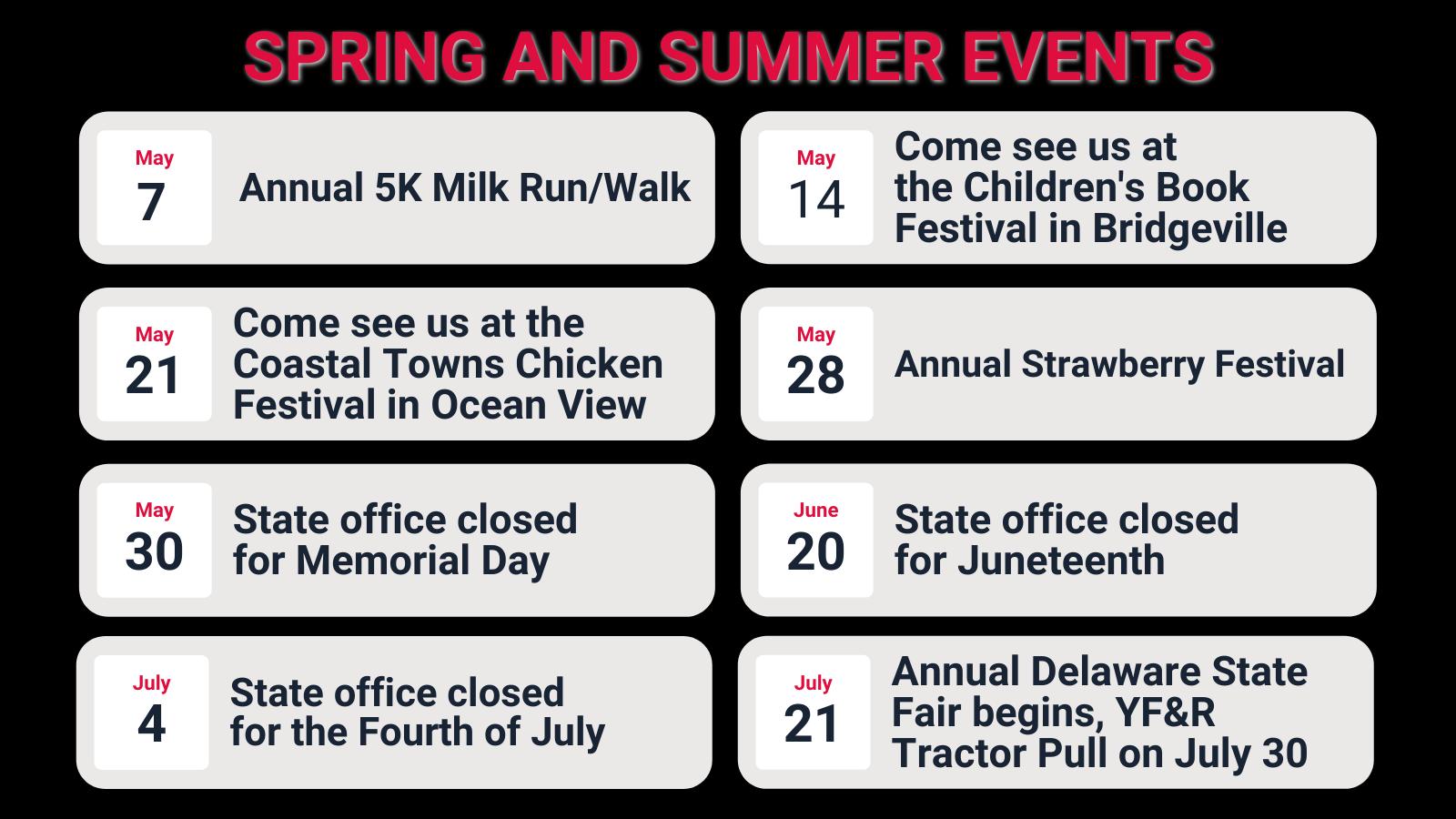
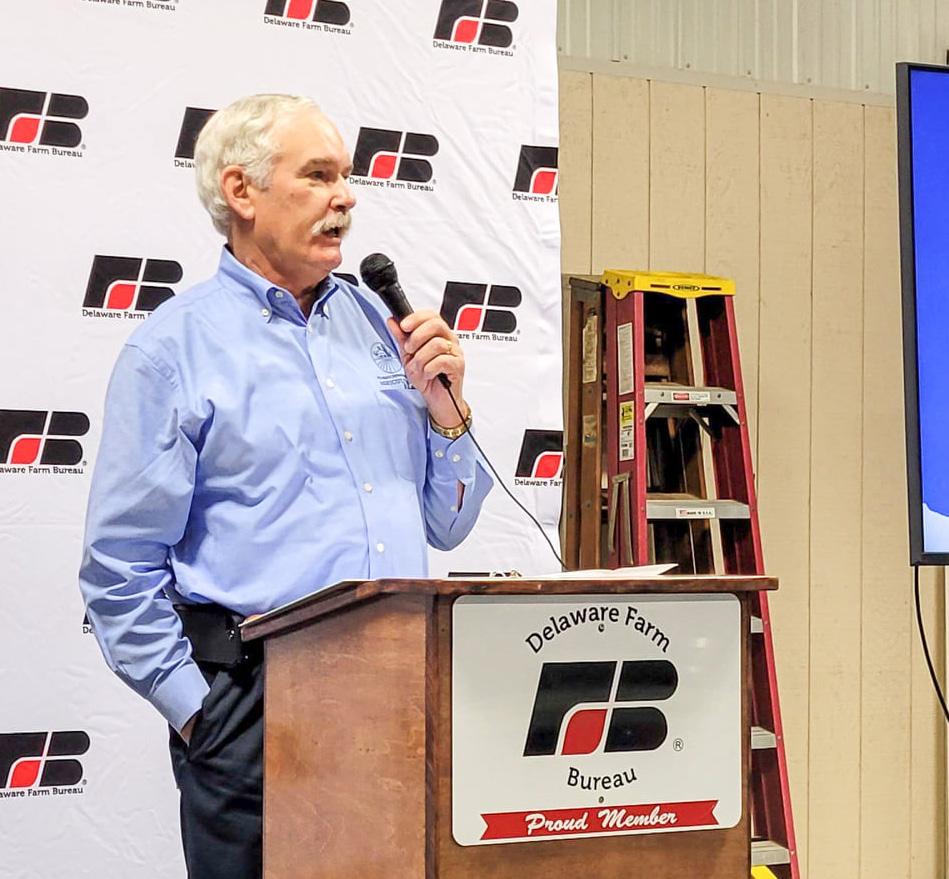
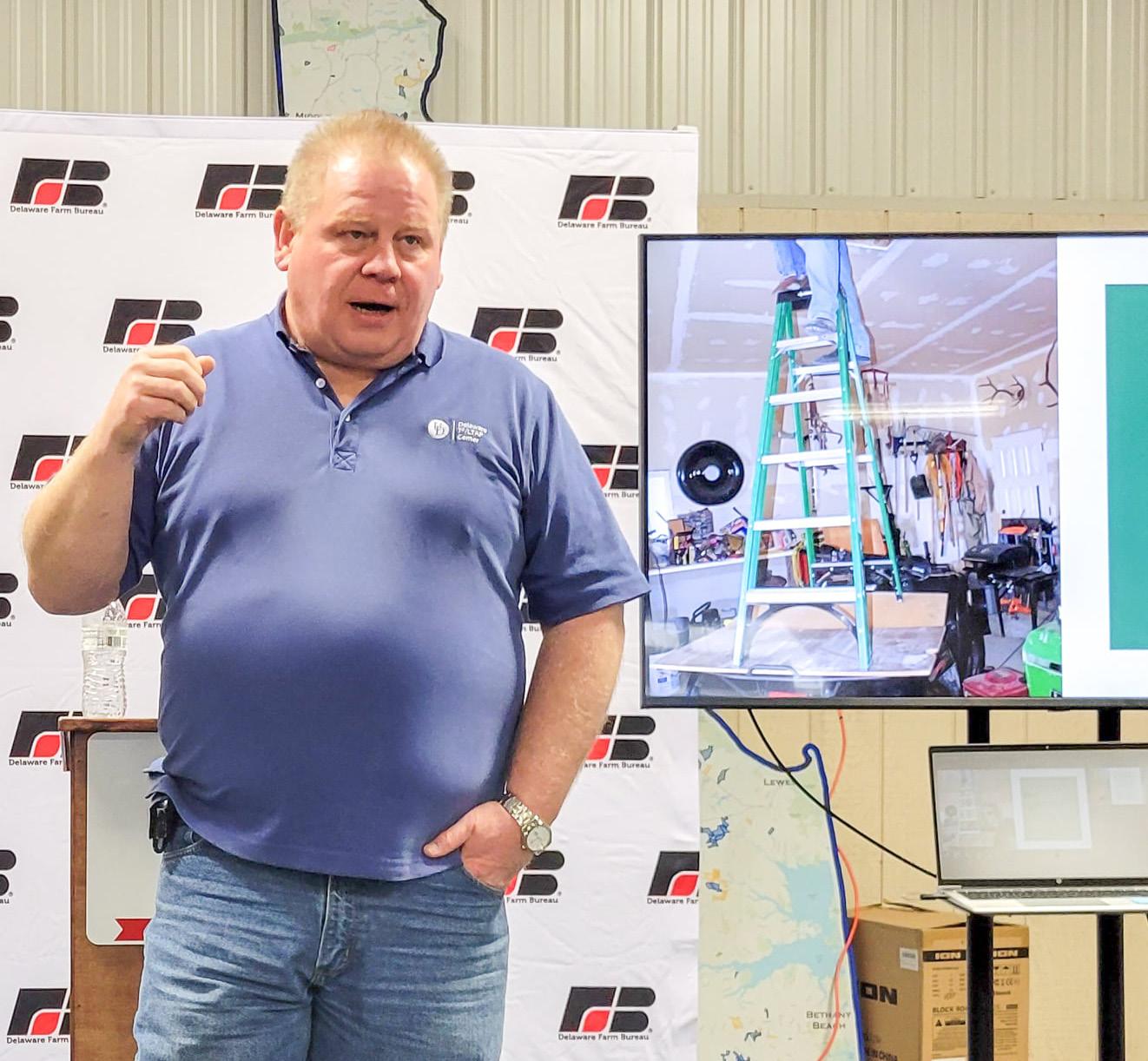
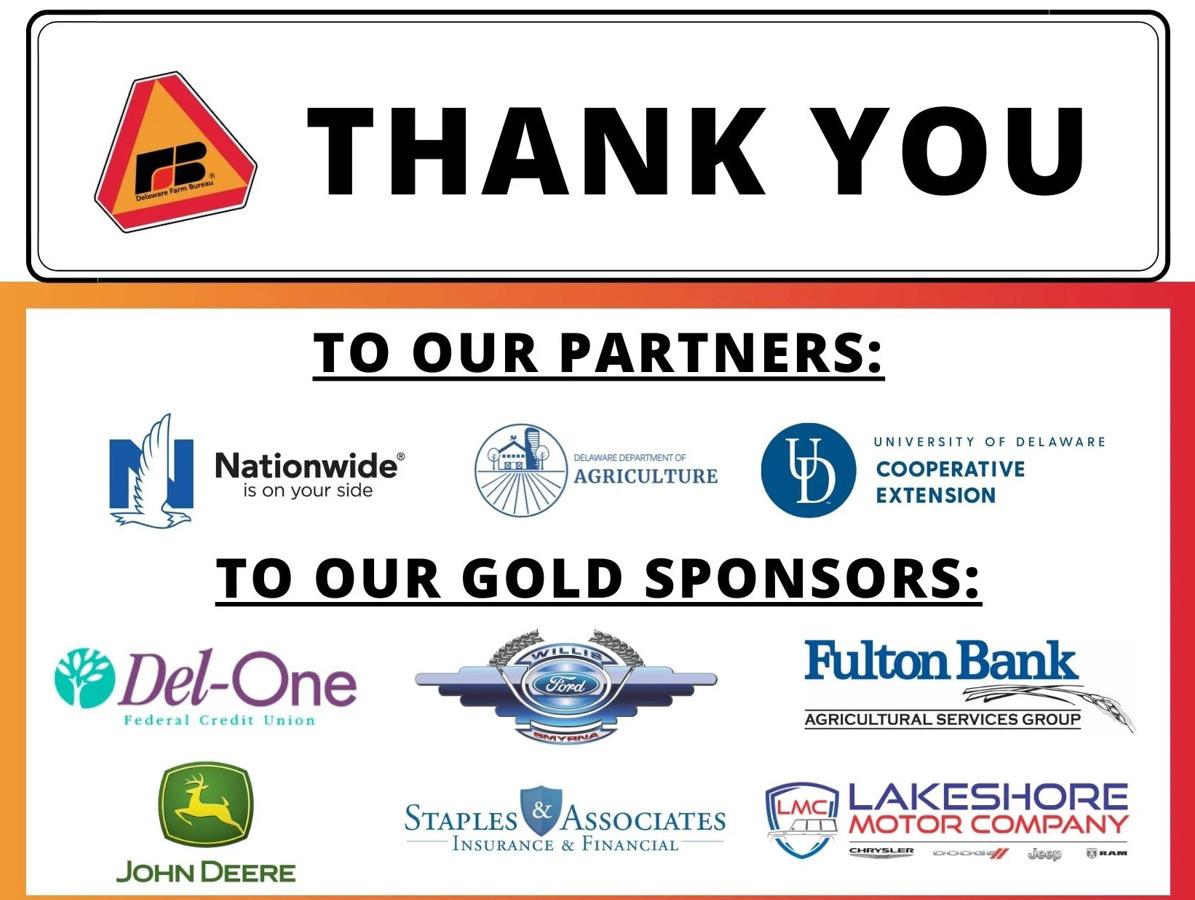



By Jennifer Antonik Delaware Farm Bureau
Nearly 50 students received a once in a lifetime gift during the 92nd Delaware FFA State Convention thanks to support from the Delaware Farm Bureau.
The organization has sponsored the Blue Jacket Bonanza in the First State since 2015, offering individualized blue corduroy FFA jackets to students in need. Students must apply prior to receiving a jacket, have a history of community service activities and leadership skills, and display a commitment to the FFA program. Jackets are then ordered to size and embroidered to include the recipient’s name and local FFA chapter.
Bill Powers, 2nd vice president for the Delaware Farm Bureau, was on hand during the convention to help pass out jackets to 47 students this year. He called the experience an honor and detailed his own time with the Delaware FFA as a greenhand and eventually a state officer from 1976-1977 along with Delaware Farm Bureau’s current President Richard Wilkins.
“The blue corduroy jacket means a lot to an FFA member,” Delaware FFA State Treasurer Bryce Banks said during the presentation at the annual convention. “I know personally, the first time I put on an FFA jacket was a
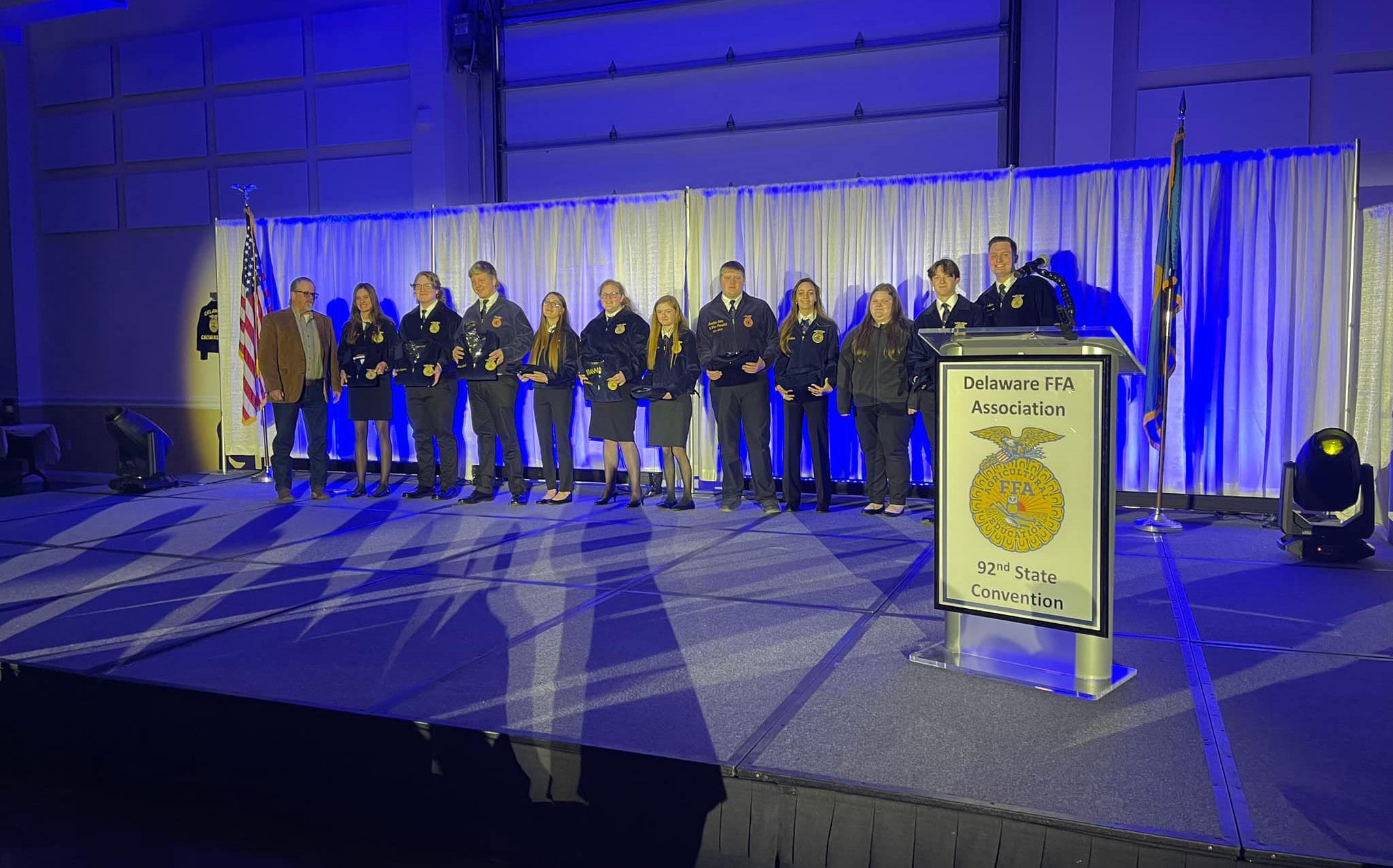
moment that made me feel as special as a TikTok influencer. This is such a special moment in an FFA member’s journey.”
Students were recognized by name during the event as Powers helped with the ceremony.
“When you receive your first
CONTINUED TO PAGE 9


blue jacket, your very own blue jacket, it’s an amazing thing to feel,” former recipient Elizabeth Houseman of Sussex Central FFA said. “So, when you receive your very first one, just remember that you earned this blue jacket and that every single one of us are so proud of everything you’ve accomplished to this point because this is the first step in your FFA story.”
The following students, listed by school, were awarded FFA jackets in 2022 through the Blue Jacket Bonanza program offered by the Delaware Farm Bureau:
Lake Forest High School
Margo Stewart Mylee Wilkie Elora Kline.
William Penn High School
Brena Rose
Darrick Walker Elian Gonzalez-Conde.
Odessa High School
Kalena Diaz
Marissa Wolf Jackson Wills.
Sussex Central High School
Elizabeth Wurst
Case Lawson
Elias Perez
Garney Hall
Payton Jones
Jasmine Hastings.
Middletown High School
Sofia Torres
Simone Cooper
Eamon Rush
Ayanna Gaston
Valli Parvataneni.
Milford High School
Elizabeth Geyer
Sabrina Kadow
Mikayla Hinson
Tabitha Lenhart
Austin Burgholzer
Jacob Wilkins.
Smyrna High School
Taylor Wallace
William Stephens
Ethan Satterfield
Colleen Nicholson
Kenidie Long
Gabriella Lamborn
Darren Jester
Geneva Catts
Nathan Roscoe
Kayla Love Vincent Chas.
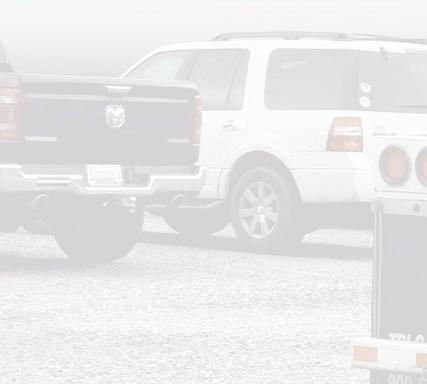


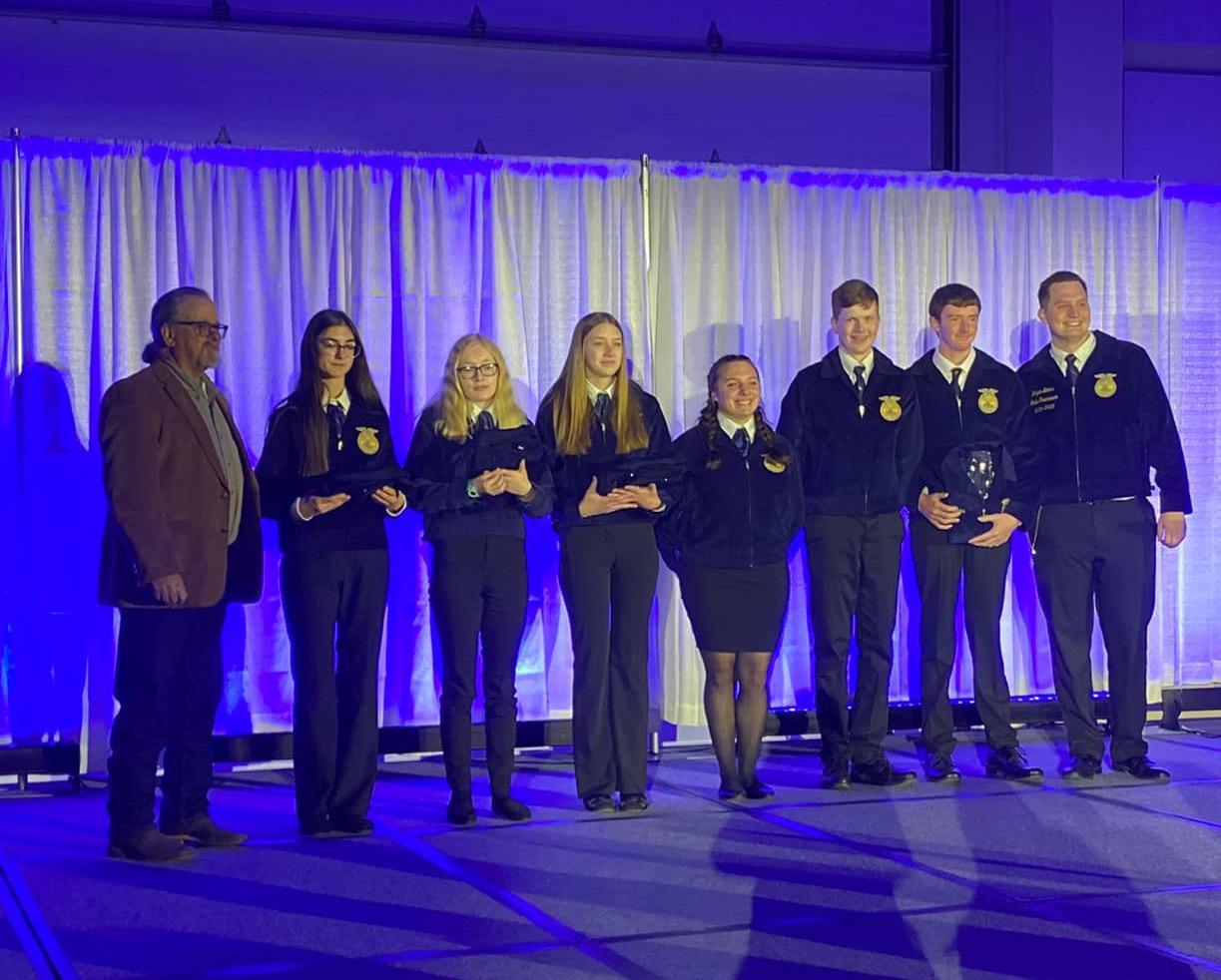
Woodbridge High School
Brianna West
Natalie McFarland.
Appoquinimick High School
Sarah McCormick
Moira Nanga
Kolin Kaiser
Alayna Christman
Ryan Franco Riley Zurzola.
Caesar Rodney High School
Karley White Kaidence Wood.
For more information, visit www.defb.org.
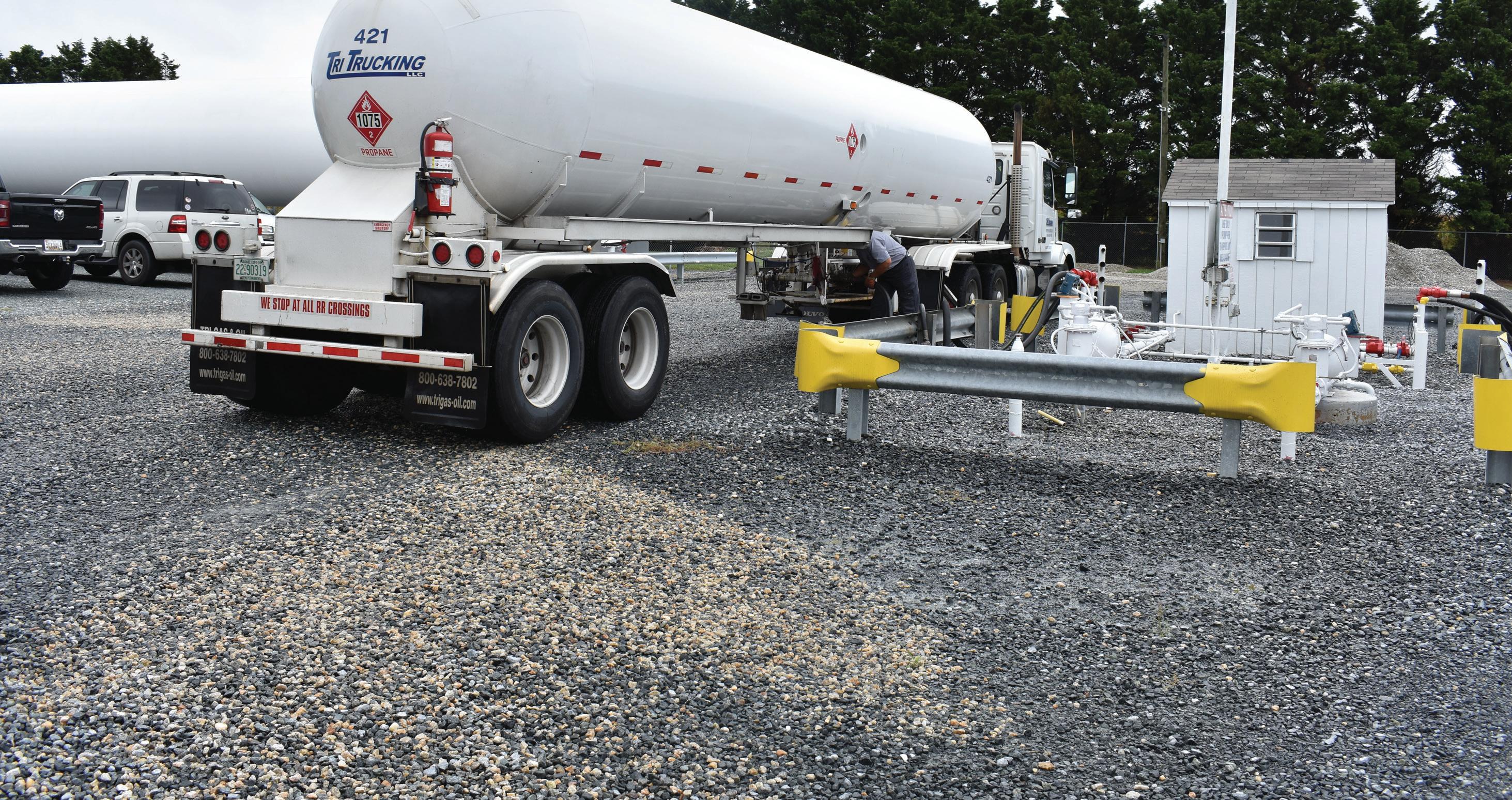



By Jennifer Antonik Delaware Farm Bureau
Preserving farmland is often a dream for many and can often be included in generational plans but financial considerations and other obstacles may make that dream difficult, if not near impossible.
That might be changing, according to New Castle County Farm Bureau President Stewart Ramsey. To help get the word out, the Delaware Farm Bureau, Delaware Cooperative Extension and Delaware Department of Agriculture teamed up and organized a program to help explain the agland preservation program as it exists in Delaware and related tax implications.
Their event was held in New Castle County April 13 at Townsend Fire Hall; the groups hope to have future meetings in Kent and Sussex County, as well.
"Folks really wanted to understand the program," Ramsey said, adding that the meeting was well attended. "Everyone who came to the meeting left with more questions than they had when we started and that’s a good thing."
Ramsey said the program was meant as a quick overview or re-introduction of the preservation program in hopes of encouraging farmers to reach out for more information on their own.
"Even I learned things I didn’t know yet. Since the meeting, I
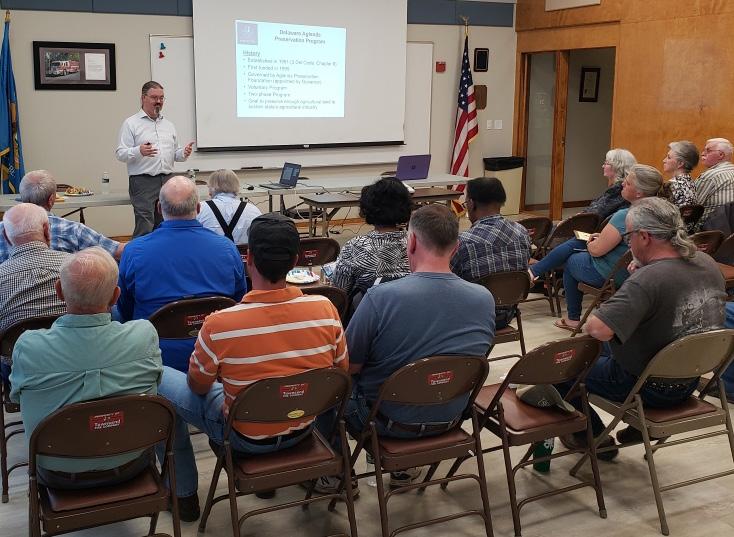
Jimmy Kroom talks about the Delaware Agland Preservation program.
know a few farmers have followed up to inquire about the idea that real estate transfer tax isn't applicable to preserved land, for example," he added.
Jimmy Kroom, Administrator for Department Management at the Delaware Department of Agriculture, was on hand during the meeting to discuss that tax and help attendees understand the historic workings of the state agland preservation program. He matched that with recent adjustments.
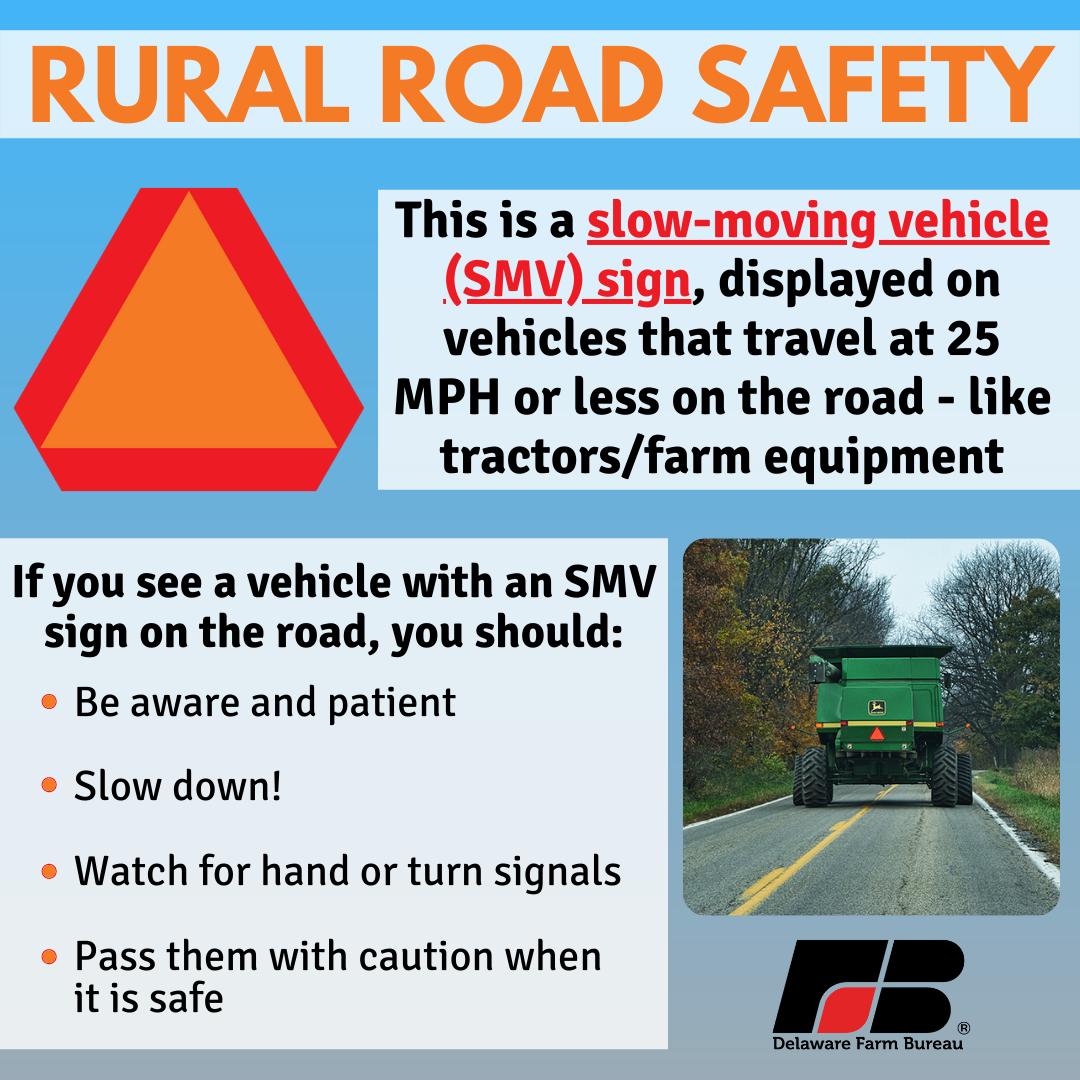
ervation.
She helped attendees understand how a “Like-Kind-Exchange” can work to guard against excessive tax burden and noted that there are many underlying rules and timing issues. She also discussed how charitable contributions could connect to agland preservation and how the sale of development rights, as is required by the agland preservation program, is not considered farm income.
But the biggest change to the agland preservation program in Delaware, Ramsey said, might be additional funds that have been added to the program in recent years.
He also dove into the young farmer program and discussed how that could help provide zero interest funds for a portion of new farm purchases for qualifying individuals.
Tracy Garofalo, an accountant with nearly two decade experience helping farmers navigate preservation, easement, and other tax issues in the states of Delaware, Pennsylvania, and Maryland, helped the group further understand possible tax implications with agland pres-
"Farmers need to be more and more aware of that because even if they thought they understood how the program was working three years ago, now there’s more money available and we need more farms to be looking into that program," he said. "When I see that there’s money at the state and county levels left unused, then I’m going to work hard to make that not happen in the future. A dollar that is not spent is a dollar that is not preserving farmland and I don’t want that."
Farmers in Kent and Sussex counties can express interest in attending a similar program located near them by sending a note to Karen Adams at adams@udel.edu or by phone at 302-856-2585 ext 540.


By Jennifer Antonik Delaware Farm Bureau
Working together to advocate for the protection and aid of farmers and consumers alike is crucial to the work of the Delaware Farm Bureau.
To make this value come to life, members met with Delaware legislators from each of the three counties in March to discuss hot topic issues and express concerns.
Senate Bill 248, sponsored by Senator Bruce Ennis, was among the top discussion points for those in attendance.
The bill seeks to exclude "structures used for agricultural, horticultural, or forest use from valuation, assessment, and taxation of property," according to the Delaware General Assembly Website.
Talking this bill through with legislators from a farming lens gave the group an opportunity to address possible feedback to the bill, according to New Castle County Farm Bureau President Stewart Ramsey.
"One of our main points is that this will help preserve the structures and the ability for farmers to provide economic viability to the farm.
It will preserve farms, farmers and ultimately farmland and it will do that through economic activity as opposed to just buying easements," Ramsey said.
He added that having multiple legislative breakfasts, one for each county, gave the Farm Bureau and legislators time to do research in between meeting dates as a way to continue the conversations.
"It's important that the legislators have good information to work with," he added.
Other hot topics during the legislative breakfasts included the impact on global markets following the war in Ukraine, rising prices, safety, traffic on local roads and avian influenza to name a few.
Like Ramsey, Laura Hill, Delaware Farm Bureau 1st vice president, attended all three legislative breakfasts. She said it was a great opportunity to not only express concerns from a farmer's perspective, but also hear concerns legislators might have regarding upcoming bills.
"Farm Bureau is very engaged with the representatives and senators in the state. As an organization,

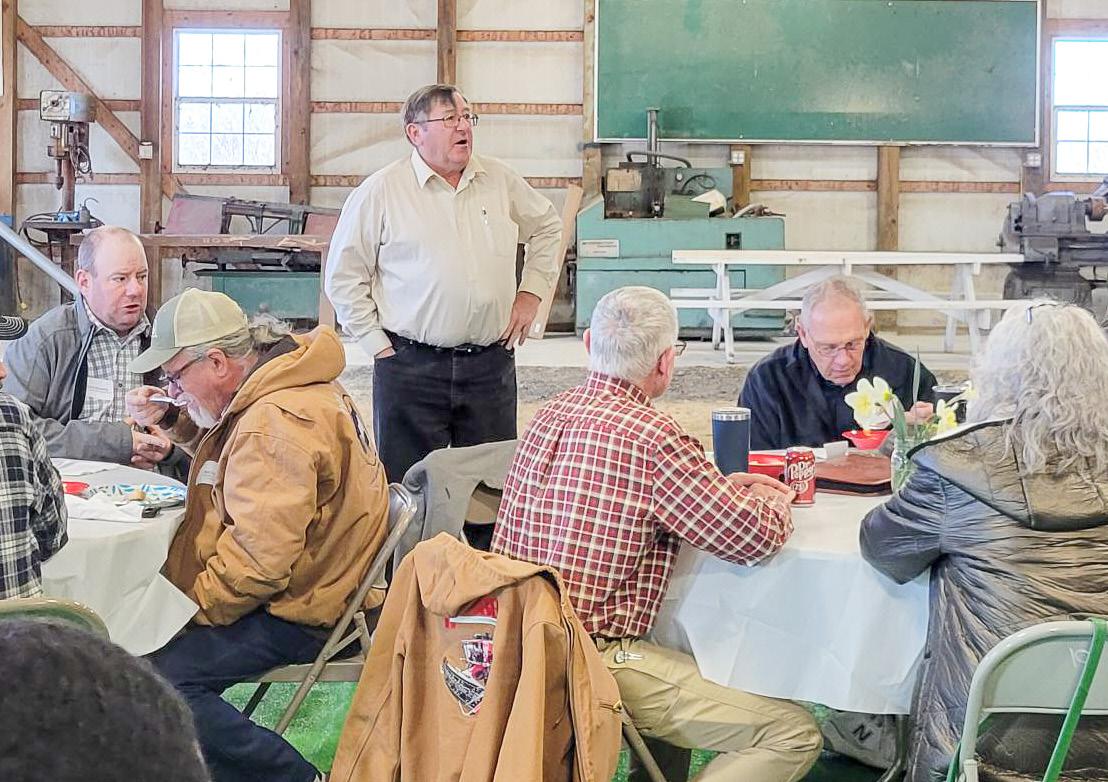
we're there looking out for the agricultural community," she said."We were very pleased with the turn out in each of the counties."
Ramsey added, "We want our members to know that we’re meeting with legislators. We have to tell the story. We’re working on it. And, you know, if there are other things
out there important to our farmers, we’d like to know about it."
State legislators in attendance at the various breakfasts included Representatives from each county government were also available at these events.
To contact the Delaware Farm Bureau, visit online at www.defb.



The following information is provided by Nationwide®, the #1 farm and ranch insurer in the U.S.*
Businesses have employed an evolving range of asset tracking tools to help keep track of things like equipment and product inventory since the 1960s. Today, asset tracking is readily available to farmers challenged by managing growing farm machinery and equipment lineups.
Asset tracking platforms like Zubie Asset Trakoffer farmers benefits in both the short and long term. And with today’s technology, it’s easier than ever to create value and ROI from proactive asset tracking . Know farm equipment whereabouts and improve field operations
If your farm’s growing, that may mean a lot more farm machinery and equipment than in the past. Whether it’s in the field, in the farm shop or anywhere in between, asset tracking creates a new set of eyes for your equipment.
A system like Zubie’s provides real-time location data so you always know where farm equipment is located. During the busy seasons of planting or harvest, this data enables you to make informed short-term decisions in scheduling field operations and managing workers to maximize productivity.
There’s a protective component to asset tracking, too. Systems like Zubie Asset Trak enable the user to create “geofences” that dictate where equipment can be operated. If a piece of equipment is outside that fence, the operator may be working in the wrong place or the equipment has fallen into the wrong hands. Asset tracking enables you to take the right corrective action, whether it’s a simple phone call to an operator or alerting the authorities that your equipment may have been stolen.
Improve farm equipment management decisions
There are also long-term ben-
efits of asset tracking that create value for your farm. In Zubie’s system, equipment location tracking does more than just keep you informed on whether it’s being used in the right fields. It helps you make more informed farm equipment management decisions.
For example, if multiple annual audits of your farm’s asset tracking data reveal you haven’t moved a piece of equipment in several years, that’s an indication you may be better off selling that equipment.
On the other hand, if asset tracking data shows one farm truck is racking up a lot more miles than it has in the past, it may tell you that you need to add another one. With more asset tracking data in hand for each piece of farm equipment, you can make more informed decisions in managing a key part of overall farm production costs.
Get up to 15% off Zubie Asset Trak devices
Now is a good time to consider adding asset tracking toyour growing equipment andmachinery lineups. Through an exclusive discount, Nationwide farm policyholderscan get up to 15% off Zubie Asset Trak devices and 1-to 3-year service subscriptions without sharing policy information. Email nationwide@zubie. com to learn more about ZubieAsset Trak and how to integrate the technology into your farm or ranch.
Visit AgInsightCenter.com for more expert tips and information from Nationwide.
*A.M. Best Market Share Report 2020.
The information was obtained from sources believed to be reliable. Nationwide Mutual Insur-
ance Company and its employees make no guarantee of results and assume no liability in connection with any training, materials, sug-
gestions or information provided. It is the user’s responsibility to confirm compliance with any applicable local, state or federal regulations. Information obtained from or via Nationwide Mutual Insurance Company should not be used as the basis for legal advice or other advice but should be confirmed with alternative sources. Nationwide, the Nationwide N and Eagle, and Nationwide is on your side are service marks of Nationwide Mutual Insurance Company. © 2021 Nationwide

